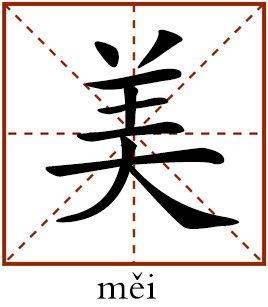Beauty

This character is often associated with beauty or aesthetics. It is composed of two parts. The upper part is the character yang, or sheep, while the lower part is da, or big. Sheep was an important form of livestock in ancient China. It is said that fat sheep, or big sheep, were considered visually lovely and to taste good. Both its appearance and taste could be described as mei. Hence, the combination of yang and da became the character mei.
香草美人
xiāng cǎo měi rén
Xiangcao refers to sweet grass that has a pleasant fragrance and meiren refers to beauty. This proverb often symbolizes the relationship between a monarch and his subjects.
The proverb originates from the long melancholic poem named Li Sao, or Sorrow after Departure. Its author is Qu Yuan (340–278 BCE), one of the greatest Chinese poets. In this poem, Qu expressed his longing for a good king and a good government and his sorrow for being plotted against by evil factions at court and as a result being rejected by his lord. He used sweet grass and beauty to symbolize good government and people of moral integrity, and the filthy and smelly to symbolize the crafty and evil, thus making a sharp contrast between the good and beautiful and the evil and hideous.
There are more than 15 types of sweet grass mentioned in the Li Sao, symbolizing lofty ideals, moral purity and goodness. For example, “For Selinea and Angelica I care,/ And wreaths of Cymbidium flowers I oft wear” (trans. Zhuo Zhenying). With the imagination of wearing scented flowers, Qu indicates that he tries to keep his integrity through self-cultivation. “A thousand or more patches of Orchids I grew,/ And planted Melilotus of a hundred mu.” Growing Orchids implies Qu’s determination and effort to maintain the personal trait of nobility.
Beauty serves as a metaphor related to the King of Chu and Qu Yuan himself. “ ’Tis true that wither may the plants, which today thrive: To meet th’ Beauty in her youth ’tis wise that I strive . . . At first we both committed ourselves to the cause,/ Why, then, did you in th’ separation I fear and resent,/ But that th’ Beauty’s changeablility I lament.” Qu compared himself to a beauty betrayed by her lover, alluding to being slandered by enemies and being rejected by the king he served.
edited by REN GUANHONG

 PRINT
PRINT CLOSE
CLOSE